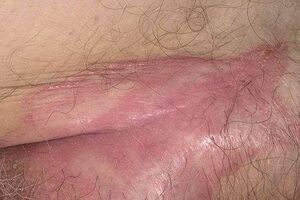Psoriasis is one of the most serious dermatological diseases. Pathology is an autoimmune untreatable nature and occurs in patients of all ages. One of the features of the disease is that it is wavy. Recurrences are followed by quiet periods and vice versa. The duration of remission always depends on the type, form of the disease and the individual characteristics of the patient.

The main symptoms of psoriasis are unpleasant pink or red spots that appear on different parts of the human body. In medical practice, such rashes are commonly referred to as plaques or papules. In most cases, the plaques are covered with pathological scales and rise a few millimeters above the surface of healthy skin. Also, the symptoms of psoriasis include symptoms such as lesions and severe itching in the area of inflammation.
Psoriasis, the cause of which is still unknown, is diagnosed in every tenth person who sees a doctor with a skin problem. The pathology is mainly prevalent in adults, but is more common in children. At risk are residents of countries with cold and humid climates. In cold countries, the incidence of the disease is higher in people living in warm climates.
What is a shell: the theory of the origin of the disease
So far, it is impossible to find the exact causes of the disease, and it is not clear how psoriasis began. Even the joint efforts of scientists around the world do not allow us to answer the question of why psoriasis occurs? According to Wikipedia, there are several theories about the occurrence of this disease in modern medical practice. However, none of this is officially supported. Theories for the development of psoriasis include:
- immunity.
- Heritage.
- Hormone Disruption Theory.
- Theory against the background of stress.
- Disorders of metabolic processes.
- Of viral origin.
Based on clinical studies and laboratory data, scientists have been able to identify several points of view that indicate possible causes of the development of pathology.
Immune Theory
Many scientists identify the causes of psoriasis in children and adults by the characteristics of the immune system. This theory is the most widespread. The appearance of plaques of a different nature in terms of their builders occurs as a result of the activity of immune cells that perceive certain areas of the dermis as aggressive. The result is a strong inflammation and redness of the skin.

According to the theory of immunity, the causes of psoriasis in the body can be as follows:
- rubbing the skin with clothes and shoes;
- burn;
- freezing;
- micro cracks;
- scratches.
According to the test results, it was possible to determine the presence of a large number of immune cells in areas where psoriatic spots are visible. This is a partial confirmation of the theory of immunity.
Genetic theory
Another name is the theory of heredity. Many scientists believe that the disease is inherited. The results are evidenced by a large number of questionnaires showing that in a pathological condition of the mother, the risk of developing a disease in a child is 20-25%. If both parents suffer from psoriasis, this ratio rises to 75.
Genetic predisposition is one of the main factors in the development of the disease. The combination of several stimuli significantly increases the risk of pathology.
Important! If a child's parents have psoriasis, this does not guarantee that the child will have the same disease. Heredity only increases the risk of disease.
Endocrine Theory
The cause of psoriasis on the hands, waist, head and other parts of the body is partly explained by the endocrine theory. Here, scientists suggest that pathological changes in the dermis are the result of hormonal imbalances in the body. Disruption of the normal functioning of the endocrine system leads to a decrease in the healthy vital activity of dermal cells.
Hormone imbalances can occur for the following reasons:
- pregnancy period;
- menstruation;
- to take hormonal drugs;
- maturity.
Important! According to medical studies, hormonal disorders in the patient's blood are not observed in all cases. Given these facts, the endocrine system cannot be considered basic.
Neurogenic Theory
The onset of psoriasis also supports the neurogenic theory. In this sense, the appearance of the disease is explained by stress and strong emotional experiences. Proponents of this theory believe that the cause of the appearance of psoriasis may be a malfunction of the central nervous system.

As a result of experiments, the patient has a phenomenon such as neurosis of the vascular wall. This causes narrowing of the vascular muscles and disruption of blood flow. The result is the appearance of scaly plaques on the body of the rash.
According to a survey of more than half of all psoriasis patients, intense experiences and stress preceded the onset of the disease.
Exchange theory
The causes of psoriasis in women and men can also be a violation of metabolic processes in the body. This is the opinion of the representatives of the theory of metabolic diseases.
According to medical research, it was possible to find a clear link between psoriasis and metabolic diseases in the body. Disruption of lipids and other processes leads to changes in blood composition, weakened immunity and other negative consequences.
The following factors can cause metabolic disorders:
- diabetes mellitus;
- kidney, liver diseases;
- unbalanced diet;
- sedentary lifestyle.
Virus Theory
Some scientists attribute the cause of psoriasis to the transmission of a viral infection or the presence of chronic inflammatory foci in the body. This theory is to some extent genetic. Proponents of this view believe that an infection can trigger the development of pathology.What factors can trigger psoriasis?
In addition to theories about the origin of the disease, there are a number of motivating factors. These include:
- Unhealthy diet, eating food allergens, enough vitamins and minerals.
- Bad habits such as alcohol and smoking, as well as drug use.
- Misuse or untimely discontinuation of medication.
- Various injuries to the dermis.
- Hormone balance in the body.
A combination of heredity and a number of triggers can lead to a disease such as psoriasis. It is very important to diagnose the pathology in time and start the necessary treatment. This will help prevent many negative consequences in the future.
Why Psoriasis Is Dangerous
At first, the disease may not be very bothersome, but if left untreated, the disease will worsen with persistent recurrence. Therefore, it is important to start treatment immediately and prevent the development of psoriasis. As a prophylaxis, you can use traditional medicine and remedies, but only with the consent of a doctor.
Now that you know what causes psoriasis, you need to start treating it. See your doctor at the first symptoms, self-medication can seriously damage your health.























